八大时态及被动语态对照表
(完整版)英语时态及被动语态_表格.doc

(完整版)英语时态及被动语态_表格.doc英语时态表(以 do 为例)完成进行一般进行完成(perfect(simple) (continuous) (perfect)continupous)现在Have/hasdo/does Is/am/are doing Have/has done ( present )been doing过去did Was/were doing Had done Had been doing (past)将来Will/shall Will/shallWill/shall do Will/shall be doing(future) have donge Have been doing过去将来Should/would Should/would Should/would Should/would do(the past future) be doing Have done Have been doing被动语态(以 be done 为例)完成进行一般进行完成(perfect (simple) (continuous) (perfect)continuous)现在Is/am/are done Is/am/areHave/has been doneHave/has( present )Being done been being done过去Was/were done Was/wereHad been doneHad(past) being done been being done 将来Will/shall be doneWill/shall Will/shall Will/shall (future) be being done have been done Have been being done 过去将来Should/would Should/would Should/would Should/would (the past future) be done Be being done Have been done Have been being done。
初中英语8种时态及情态动词的被动语态 总结表格版
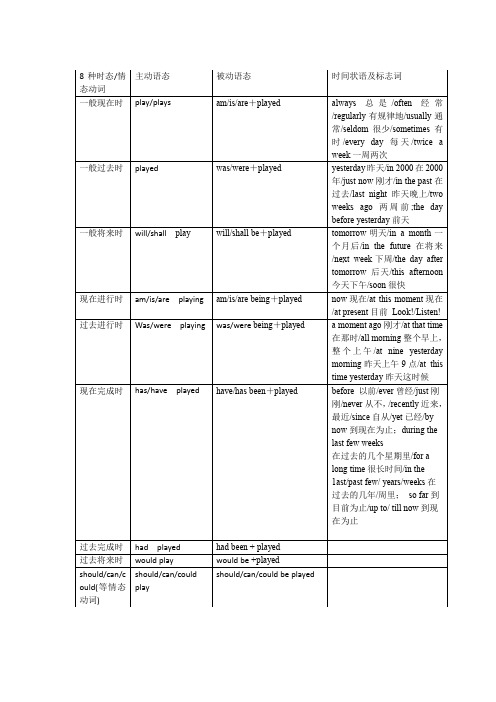
tomorrow明天/in a month一个月后/in the future在将来/next week下周/the day after tomorrow后天/this afternoon今天下午/soon很快
现在进行时
am/is/are playing
am/is/are being+played
一般现在时plຫໍສະໝຸດ y/playsam/is/are+played
always总是/often经常/regularly有规律地/usually通常/seldom很少/sometimes有时/every day每天/twice a week一周两次
一般过去时
played
was/were+played
yesterday昨天/in 2000在2000年/just now刚才/in the past在过去/last night昨天晚上/two weeks ago两周前;the day before yesterday前天
should/can/could(等情态动词)
should/can/could play
should/can/could be played
时态解题步骤
看时间标志词确定时态看主语与动词关系确定语态看人称确定单复数
现在完成时
has/have played
have/has been+played
before以前/ever曾经/just刚刚/never从不,/recently近来,最近/since自从/yet已经/by now到现在为止;during the last few weeks
在过去的几个星期里/for a long time很长时间/in the 1ast/past few/years/weeks在过去的几年/周里;so far到目前为止/up to/ till now到现在为止
(完整word版)八种时态主动语态被动语态
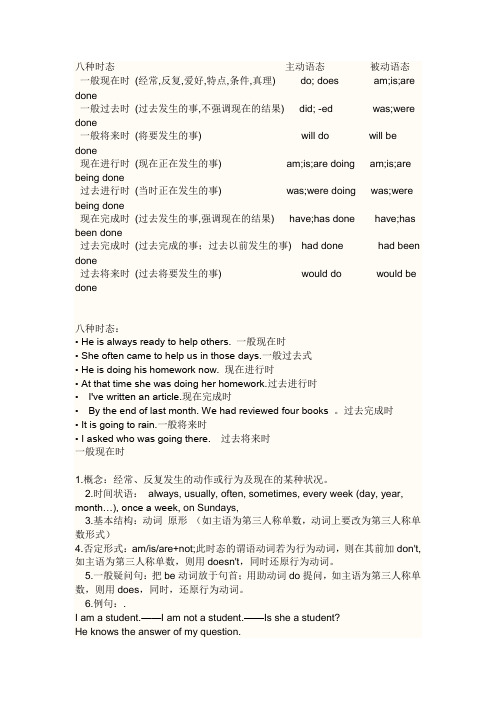
八种时态主动语态被动语态一般现在时(经常,反复,爱好,特点,条件,真理) do; does am;is;are done一般过去时(过去发生的事,不强调现在的结果) did; -ed was;were done一般将来时(将要发生的事) will do will be done现在进行时(现在正在发生的事) am;is;are doing am;is;are being done过去进行时(当时正在发生的事) was;were doing was;were being done现在完成时(过去发生的事,强调现在的结果) have;has done have;has been done过去完成时(过去完成的事;过去以前发生的事) had done had been done过去将来时(过去将要发生的事) would do would be done八种时态:• He is always ready to help others. 一般现在时• She often came to help us in those days.一般过去式• He is doing his homework now. 现在进行时• At that time she was doing her homework.过去进行时• I've written an article.现在完成时• By the end of last month. We had reviewed four books 。
过去完成时• It is going to rain.一般将来时• I asked who was going there. 过去将来时一般现在时1.概念:经常、反复发生的动作或行为及现在的某种状况。
2.时间状语:always, usually, often, sometimes, every week (day, year, month…), once a week, on Sundays,3.基本结构:动词原形(如主语为第三人称单数,动词上要改为第三人称单数形式)4.否定形式:am/is/are+not;此时态的谓语动词若为行为动词,则在其前加don't,如主语为第三人称单数,则用doesn't,同时还原行为动词。
八种时态及含有情态动词的主动、被动语态结构表
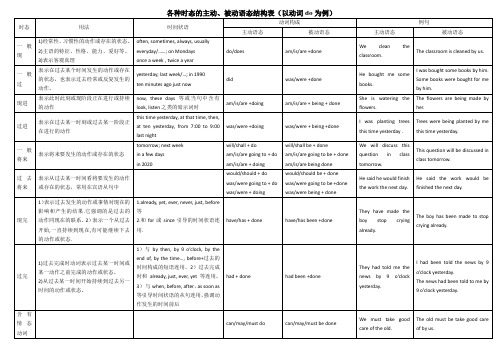
in a few days
in 2020
will/shall + do
am/is/are going to + do
am/is/are + doing
will/shall be + done
am/is/are going to be + done
am/is/are being done
had + done
had been +done
They had told me the news by 9 o’clock yesterday.
I had been told the news by 9 o’clock yesterday.
The news had been told to me by 9 o’clock yesterday.
was/were +doing
was/were + being +done
I was planting trees this time yesterday .
Trees were being planted by me this time yesterday.
一般将来
表示将来要发生的动作或存在的状态
do/does
am/is/are +done
We clean the classroom.
The classroom is cleaned by us.
一般过
表示在过去某个时间发生的动作或存在的状态,也表示过去经常或反复发生的动作。
yesterday; last week/…; in 1990
(完整word版)八种时态主动语态被动语态

八种时态主动语态被动语态一般现在时(经常,反复,爱好,特点,条件,真理) do; does am;is;are done一般过去时(过去发生的事,不强调现在的结果) did; -ed was;were done一般将来时(将要发生的事) will do will be done现在进行时(现在正在发生的事) am;is;are doing am;is;are being done过去进行时(当时正在发生的事) was;were doing was;were being done现在完成时(过去发生的事,强调现在的结果) have;has done have;has been done过去完成时(过去完成的事;过去以前发生的事) had done had been done过去将来时(过去将要发生的事) would do would be done八种时态:• He is always ready to help others. 一般现在时• She often came to help us in those days.一般过去式• He is doing his homework now. 现在进行时• At that time she was doing her homework.过去进行时• I've written an article.现在完成时• By the end of last month. We had reviewed four books 。
过去完成时• It is going to rain.一般将来时• I asked who was going there. 过去将来时一般现在时1.概念:经常、反复发生的动作或行为及现在的某种状况。
2.时间状语:always, usually, often, sometimes, every week (day, year, month…), once a week, on Sundays,3.基本结构:动词原形(如主语为第三人称单数,动词上要改为第三人称单数形式)4.否定形式:am/is/are+not;此时态的谓语动词若为行为动词,则在其前加don't,如主语为第三人称单数,则用doesn't,同时还原行为动词。
被动语态——八种时态

被动语态被动语态的最基本构成是:be + done(动词的过去分词形式)被动语态和时态是分不开的。
很多时态都有其被动语态形式。
总结如下:1) 一般现在时一般现在时主要由动词原形表示,但第三人称单数后要加词尾-s,其方法与名词单数变复数的方法相同。
另外,be和have有特殊的人称形式,be在I后为am;在he,she,it后为is;在we,you,they后为are;have在第三人称单数后为has,在其他人称后仍为have。
被动语态:be(am/is/are) + done (by)主动语态:Everyone likes her.被动语态:She is liked by everyone.2) 现在进行时现在进行时由“be(am/is/are) +现在分词”构成,其否定式是在be后加not,疑问式是将be提前。
They are building a new school in our village.She is cleaning the classroom.被动语态:be(am/is/are) being doneA new school is being built in our village.The classroom is being cleaned (by her).3) 现在完成时现在完成时由“have (has)+过去分词”构成。
否定式在have (has)后加not,疑问式将have (has)提前。
They have built a new school in our village.I have taught English for 20 years.被动语态:have/has been + doneA new school has been built in our village.5) 一般过去时由动词的过去式表示,其变化是在动词后加-ed,但英语中有大量动词的变化是不规则的,需特别记忆。
各种时态的被动语态构成

各种时态的被动语态构成一般现在时: S + am/is /are +Vpp 一般过去时: S + was/were +Vpp 一般将来时: S+ will/shall/is going to+be+ Vpp 过去将来时: S+would+be +Vpp现在进行时: S+ am/is/are + being + Vpp过去进行时: S+ was/were + being+ Vpp现在完成时: S+ have/has + been+ Vpp 过去完成时: S +had +been + Vpp情态动词: S+ can/may/must/should + be+ Vpp1.watch / let / have / hear/ see /notice/help sb + V. 用于被动语态时,to 还原。
2.只有及物动词才有被动语态,不及物动词则没有被动语态。
但有些不及物动词后面跟上介词或副词后,变成一个动词短语,相当于一个及物动词,就可以形成被动语态。
3. 没有被动语态的词,表示状态或特征的及物动词如cost, fit, have, suit等没有被动形式,另外,像happen = take place, break out(爆发),break down(坏了) result from(缘于),belong to, consist of等只用主动语态,而不用被动语态4. 大多数系动词:be , feel (摸起来),sound(听起来),smell(闻起来),taste(尝起来),look(看起来),等词无被动语态,它们的主动形式表示被动意义。
5. 被动语态中,修饰动词的副词放在be形式之后,本身与动词构成词组的位置不变。
E.g. a. The baby is well looked after by the man. / The baby is well taken care of by the man. b. The film is thought highly of by these people.1. (10年高考I 32题)The discovery of gold in Australia led thousands to believe that a fortune ____ . A. is made B. would make C. was to be made D. had made2. (10年高考II15题)Linda, make sure that the tables ___ before the guests arrive.A. be setB. setC. are setD. are setting3. (09年高考I 26题)His sister left home in 1998, and ____ since.A. had not been heard ofB. has not been heard ofC. had not heard ofD. has not heard of4. (09年高考II 8题)Progress ____ so far very good and we are sure that the work will be finished on time. A. was B. had been C. has been D. will be5. (08年高考I 9题)The wet weather will continue tomorrow, when a cold front ___ to arrive.A. is expectedB. is expectingC. expectsD. will be expected6. (07年高考I 35题) The flowers were so lovely that they _____ in no time.A. soldB. had been soldC. were soldD. would sell7. (06年高考I 29题) The water _____ cool when I jumped into the pool for morning exercise.A. was feltB. is feltC. feltD. feels8.(06年高考II 31题) Eliza remembers everything exactly as if it _____ yesterday.A. was happeningB. was happenedC. had happenedD. happened9. (05年高考I 33题) The hero’s story _____ differently in the newspapers.A. was reportedB. was reportingC. reportsD. reported10. (04年高考I 28题) Sarah, hurry up. I’m afraid you can’t have time to ____ before theparty. A. get changed B. get change C. get changing D. get to change 11. (04年高考II 34题) According to the art dealer, the painting ____ to go for at least amillion dollars. A. is expected B. expects C. expected D. is expecting12. (04年高考III 25题) --- The window is dirty. ----- I know. It ____ for weeks.A. hasn’t cleanedB. didn’t cleanC. wasn’t cleanedD. hasn’t been cleaned13. (03年高考30题) Why don’t you put the meat in the fridge? It will ___ fresh for severaldays. A. be stayed B. stay C. be staying D. have stayed14. All those old buildings ______ down tomorrow.A. will be knockedB. will knockC. will have knockedD. knock15. Every possible means ___ to prevent the air pollution, but the sky is still not clear.A. is usedB. are usedC. has been usedD. have been used16. It is said that a new robot ____by him in a few days.A. designedB. has been designedC. will be designedD. will have been designed17. Selecting a mobile phone for use is no easy task because technology _____ so rapidly.A. is changingB. has changedC. will have changedD. will change18. They ___ day and night.A. are made workB. are made to workC. made to be workedD. are making to work19. Dinosaurs ____ about 65 million years ago.A. were disappearedB. are disappearedC. disappearedD. disappear20.The dog ____ the big tree, or it’ll run away.A. has to tie itB. must be tied onC. should tie toD. should be tied to21. - __ the sports meet might be put off. - Yes, it all depends on the weather.A. I’ve been toldB. I’ve toldC. I’m toldD. I told22. It is said that pandas _____ in our country year after year.A. are being disappearedB. are disappearingC. will be disappearedD. will disappear23. The accident ______ last week.A. was happenedB. happenedC. is happenedD. are happened24. His Selected Poems _______ in 1970.A. were publishedB. was publishedC. is publishedD. has been published25. That big room _____ for meetings.A. usesB. shall useC. is usingD. can be used26. With more forests being destroyed, huge quantities of good earth ______ eachyear. A. is washing away B. is being washed awayC. are washing awayD. are being washed away27. The radar sets _____ for a long time without any trouble.A. have been runningB. have been runC. have runD. were running28. Do you remember _____ to Dr. Henry during your last visit?A. to be introducedB. being introducedC. having introducedD. to have introducedII. 单句改错:1. Many new buildings were built since 2000.2. Look! A frog is swallowed by a snake over there.3. Great changes have been taken place in my hometown.4. This book is worth being read.5. The baby is being taken care by the parents.6. The boy was made stay at home doing his homework.。
英语八大基本时态及其对应被动语态

时态
主动语态
被动语态
现在完成时 过去完成时 一般将来时
has/have + has/have + 过去分词 been+过去分词
had + 过去分词 1. will/shall+ do
had + been+过去分词
1. will/shall+ be+过去分词
2. am/is/are+ 2. am/is/are+ going to be+过去分词 going to do 1. would/should+ do 1. would/should+
பைடு நூலகம்时态
主动语态
被动语态
一般现在时
一般过去时
1. am/is/are 2. 动词原形 1. was/were 2. 动词过去式
am/is/are + 过去分词 was/were + 过去分词
现在进行时 过去进行时
am/is/are + am/is/are + doing being+过去分词 was/were + was/were + doing being+过去分词
be+过去分词
过去将来时 2. was/were+ going to do
2. was/were+ going to be+过去分词
句型转换
• • • • • • • • • • All his students love him. He is loved by all his students. My aunt brought me up. I was brought up by my aunt. We will hold an examination next week. An examination will be held next week. We are going to discuss this problem tomorrow. This problem is going to be discussed tomorrow. We have finished this task. This task have been finished.
八大时态的被动语态结构

八大时态的被动语态结构
以下是八大时态的被动语态结构:
1. 现在时被动语态(Present Simple Passive):主语 + am/is/are + 过去分词。
2. 过去时被动语态(Past Simple Passive):主语 + was/were + 过去分词。
3. 将来时被动语态(Future Simple Passive):主语+ will be + 过去分词。
4. 现在进行时被动语态(Present Continuous Passive):主语 + am/is/are being + 过去分词。
5. 过去进行时被动语态(Past Continuous Passive):
主语 + was/were being + 过去分词。
6. 现在完成时被动语态(Present Perfect Passive):
主语 + has/have been + 过去分词。
7. 过去完成时被动语态(Past Perfect Passive):主语 + had been + 过去分词。
8. 将来完成时被动语态(Future Perfect Passive):主语 + will have been + 过去分词。
(完整版)各种时态的被动语态举例

各种时态的被动语态举例(以动词do为例)1.一般现在时(am/ is/ are +done)English is spoken by lots of people in the world. 世界上的许多人都说英语。
Class meeting is held every Thursday. 每周四都举行班会。
The classroom is cleaned by the students every day. 学生们每天都打扫教室。
2.一般过去时(was/ were +done)The cup was broken by the boy. 杯子被那个男孩打碎了。
He was saved at last. 他最终获救了。
My bike was stolen. 我的自行车被偷了。
3.一般将来时与过去将来时(will/ shall be +done; would/should be +done)A speech will be given this afternoon. 今天下午有一个演讲。
A new road will be built next year. 明年要修一条新马路。
I thought thousands of people would be helped. 我认为将有数千人得到帮助。
4.现在进行时与过去进行时(am/ is/ are being +done; was/ were being +done) The machine was being repaired at this time yesterday. 昨天这时,机器正在被修理。
The problem is being discussed now. 问题正在被讨论。
A bus is being pushed by the passengers. 路人正在推一辆公共汽车。
5.现在完成时(have/ has been + done)Two hundred trees have been planted by now. 到现在为止,已经种了二百棵树了。
高二英语常用八种时态主,被动语态

4.现在进行时 is/am/are not writing is/am/are not being written
5.过去进行时 was/were not writing was/were not being written 6.现在完成时 have/has not written 7.过去完成时 had not written 8.过去将来时 Would not/be not going to write may/ can …write 9.情态动词 have/has not been written had not been written Would not/be not going to be written may/can…be written
常用八种时态主,被动语态的构成(以write为例)
时 态 主动语态否定句 被动语态否定句
1.一般现在时 don’t/doesn’t write
2.一般过去时 didn’t write 3.一般将来时 shall/will not write be not going to write
is/am/are not written
三.时态主态与被动语态的变化方法
• They will plant some trees next week
• • Some trees will be planted by them next week • 方法;
• 1.把主动语态的宾语提到语首. • 2.把主动语态的谓语形式变为被动语态的谓语 形式. • 3.在主动语态的主语前加介词by(用宾格) 放在谓语动词之后.
03八大时态和被动语态

7.过去完成时: (The Past Perfect Tense)
表示在过去某一时刻前已完成的 概念:
动作。也称“过去的过去”
谓语动词形式 : had + 过去分词 常用时间状语 :
by the end of last year, by, before + 过去的时间点;由when, before, after, by the time 等引导的状语从句中,表示主 句的动作发生在从句之前。
谓语动词形式
原形或三单 (do.does)
am,is,are +现在分词(doing)
动词的过去式(did)
was,were+现在分词(doing) have/has +过去分词(done) had +过去分词(done) will/be going to+动词原形(do)
would 或was/were going to + 动词原形
一般现在时代替将来时
5.Peter usually w__ his clothes on weekends.
wears— 一般现在时
1. 时间副词now或提示性动词listen, look决定的现在进行时
Listen! Someone ______ outside. A. sing B. sings C. is singing D. are singing
4. 人或事物的状态、特征和客观存在情况下的一般现在时态
-What do you do? -I’m an engineer. I _______ in a company in Wu Han. I like my job very much. A. work B. had worked C. will work D. worked
初中英语八大时态表
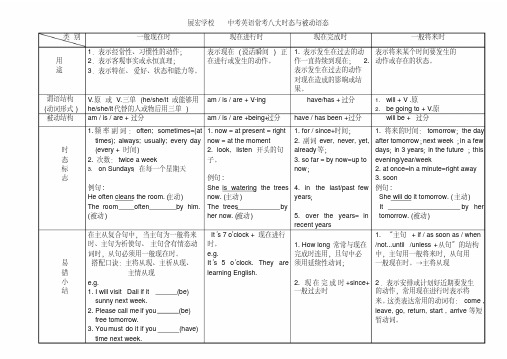
展宏学校中考英语常考八大时态与被动语态类别一般现在时现在进行时现在完成时一般将来时用途1.表示经常性、习惯性的动作;2.表示客观事实或永恒真理;3.表示特征、爱好、状态和能力等。
表示现在(说话瞬间) 正在进行或发生的动作。
1. 表示发生在过去的动作一直持续到现在; 2.表示发生在过去的动作对现在造成的影响或结果。
表示将来某个时间要发生的动作或存在的状态。
谓语结构(动词形式) V.原或V.三单(he/she/it或能够用he/she/it代替的人或物后用三单)am / is / are + V.-ing have/has + 过分 1.will + V.原2.be going to + V.原被动结构am / is / are + 过分am / is / are +being+过分have / has been + 过分will be + 过分时态标志1.频率副词:often; sometimes=(attimes); always; usually; every day(every + 时间)2. 次数:twice a week3.on Sundays:在每一个星期天例句:He often cleans the room. (主动)The room often by him.(被动)1. now = at present = rightnow = at the moment2. look, listen 开头的句子。
例句:She is watering the treesnow. (主动)The trees byher now. (被动)1. for / since+时间;2. 副词ever, never, yet,already等;3. so far = by now=up tonow;4. in the last/past fewyears;5. over the years= inrecent years1. 将来的时间:tomorrow;the dayafter tomorrow;next week ;in a fewdays;in 3 years;in the future ;thisevening/year/week2. at once=in a minute=right away3. soon例句:She will do it tomorrow. (主动)It by hertomorrow. (被动)易错小结在主从复合句中,当主句为一般将来时、主句为祈使句、主句含有情态动词时,从句必须用一般现在时。
8种时态的被动语态

动词的语态:主动语态和被动语态被动语态的基本结构:Be + done(过去分词)1、一般现在时:(主动语态)I help you.发出者动词承受者变为被动语态:Do——am/is/are doneYou are helped by me.承受者谓语发出者2、一般过去时的被动:did——was/were done(I helped you.-每个例子可让学生自己先尝试变被动,再给答案)3、一般将来时的被动:Will do——will be done(I will help you.-)4、现在进行时的被动:Am/is/are doing ——Am/is/are being done(I am helping you.-)5、过去进行时的被动:Was/were doing——Was/were being done(I was helping you.-)6、现在完成时的被动:Have done——have been done (I have helped you.-)7、过去完成时的被动:Had done——had been done (I had helped you.-)8、过去将来时的被动:Would do ——would be done (I would help you.-)答案:2、You were helped by me.3、You will be helped by me.4、You are being helped by me.5、You were being helped by me.6、You have been helped by me.7、You had been helped by me.8、You would be helped by me.。
各种时态的被动语态

各种时态的被动语态一、八大时态的被动语态的构成:1.一般现在时的被动语态构成:(am/is/are +done)如:I am asked to study hard. 我被请求努力学习。
This shirt is washed once a week. 这件T恤一周洗一次。
These songs are usually sung by boys. 这些歌曲通常是男生唱的。
2.一般过去时的被动语态构成:(was/were done)如:The soldier was killed, but the train was saved. 这位战士牺牲了,然而列车得救了。
Some notes were passed up to the speaker. 有人给讲演者递上来一些纸条。
3.一般将来时的被动语态构成:(shall/will be done)如:We shall be asked a lot of strange questions. 我们将被问许多怪题。
My son will be sent to school next September. 来年九月我将送我儿子去读书。
4.过去将来时的被动语态构成:(should/would be done)如:The news would be sent to him as soon as it arrived. 消息一到就会转给他的。
He told us that the new railway would be built the next year.5.现在完成时的被动语态构成:(has/have been done)如:The work has just been finished. 工作刚刚结束。
The old rules have been done away with by us. 旧规章已经被我们废除了。
6.过去完成时的被动语态构成:(had been done)如:By last December three ships had been built by them.到去年十二月底他们已建造了三艘船。
八个时态(含被动语态)
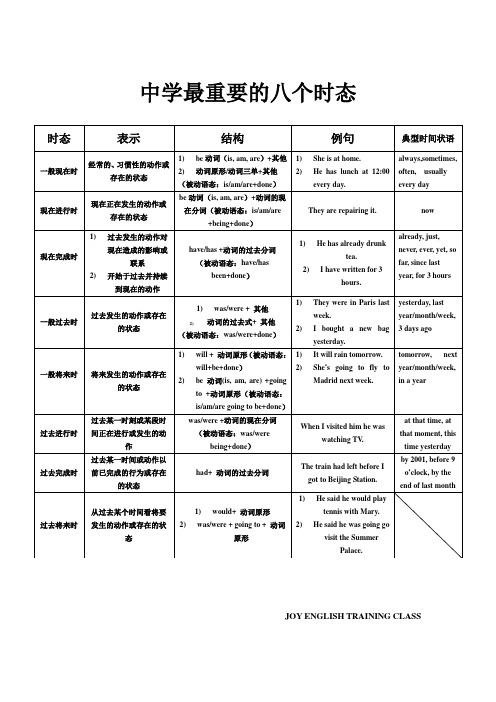
中学最重要的八个时态JOY ENGLISH TRAINING CLASS时态表示结构例句典型时间状语一般现在时经常的、习惯性的动作或存在的状态1) be 动词(is, am, are )+其他 2)动词原形/动词三单+其他(被动语态:is/am/are+done ) 1) She is at home. 2)He has lunch at 12:00 every day.always,sometimes, often, usuallyevery day现在进行时现在正在发生的动作或存在的状态 be 动词(is, am, are )+动词的现在分词(被动语态:is/am/are+being+done ) They are repairing it.now现在完成时1)过去发生的动作对现在造成的影响或联系2)开始于过去并持续到现在的动作have/has +动词的过去分词 (被动语态:have/hasbeen+done )1) He has already drunktea.2)I have written for 3hours.already, just, never, ever, yet, so far, since last year, for 3 hours一般过去时过去发生的动作或存在的状态1)was/were + 其他 2)动词的过去式+ 其他(被动语态:was/were+done ) 1) They were in Paris last week. 2)I bought a new bag yesterday.yesterday, last year/month/week, 3 days ago一般将来时将来发生的动作或存在的状态1)will + 动词原形(被动语态:will+be+done )2)be 动词(is, am, are) +going to +动词原形(被动语态:is/am/are going to be+done ) 1) It will rain tomorrow. 2)She ’s going to fly to Madrid next week.tomorrow, nextyear/month/week,in a year过去进行时过去某一时刻或某段时间正在进行或发生的动作was/were +动词的现在分词 (被动语态:was/werebeing+done ) When I visited him he waswatching TV . at that time, at that moment, this time yesterday 过去完成时过去某一时间或动作以前已完成的行为或存在的状态had+ 动词的过去分词The train had left before I got to Beijing Station. by 2001, before 9 o ’clock, by the end of last month过去将来时从过去某个时间看将要发生的动作或存在的状态1) would+ 动词原形2)was/were + going to + 动词原形1)He said he would play tennis with Mary.2)He said he was going go visit the SummerPalace.。
八大时态及被动语态对照表

八大时态对照表八大时态及被动语态对照表常见英语过去式和过去分词规那么的动词begin 〔开始〕began begun drink 〔喝〕drank drunk ring 〔铃口向〕rang rung sing 〔唱〕sang sung swim 〔游泳〕swam swum blow 〔吹〕blew blown draw 〔画〕drew drawn fly 〔飞〕flew flowngrow 〔生长〕grew grownknow 〔知道〕knew knownthrow 〔投掷〕threw thrownshow 〔出示〕showed shownbreak 〔打破〕broke brokenchoose 〔选择〕chose chosenforget 〔忘十己〕forgot forgotten 〔forgot〕speak 〔说,讲〕spoke spokenwake 〔醒〕woke wokendrive 〔驾驶〕drove driveneat 〔吃〕ate eatenfall 〔落下〕fell fallen give 〔给〕gave given rise 〔升高〕rose risen take 〔取〕took taken mistake 〔弄夸昔〕mistook mistaken ride 〔骑〕rode ridden write 〔写〕wrote written do 〔做〕did donego 〔去〕went gonelie 〔平■躺〕lay lainsee 〔看见〕saw seenwear 〔穿〕wore worn不规那么的动词cost 〔花费〕cost costcut 〔割〕cut cuthit 〔打〕hit hithurt 〔伤害〕hurt hurtlet 〔让〕let letput 〔放〕put putread 〔读〕read read〔2〕AAB型〔动词原形与过去式同形〕beat 〔跳动〕beat beaten〔3〕ABA型〔动词原形与过去分词同形〕become 〔变成〕became becomecome 〔来〕came comerun 〔跑〕ran run⑷ABB型〔过去式与过去分词同形〕dig 〔挖〕dug dugget 〔得至U〕 got gothang 〔吊死〕hanged hangedhang 〔悬挂〕hung hunghold 〔抓住〕held heldshine 〔照耀〕shone shonesit 〔坐〕sat satwin 〔赢〕won wonmeet 〔遇见〕met metkeep 〔保持〕kept kept sleep 〔睡〕slept slept sweep 〔扫〕swept sweptfeel 〔感觉〕felt feltsmell 〔闻〕smelt smelt leave 〔离开〕left left build 〔建设〕built built lend 〔借出〕lent lent send 〔传送〕sent sentspend 〔花费〕spent spentlose 〔丧失〕lost lost burn 〔燃烧〕burnt burnt learn 〔学习〕learnt learnt sell 〔卖〕sold sold tell 〔告诉〕told toldmean 〔意思〕meant meantcatch 〔抓住〕caught caughtteach 〔教〕taught taught bring 〔带来〕brought brought fight 〔战斗〕fought foughtbuy 〔买〕bought boughtthink 〔想〕thought thoughthear 〔听见〕heard heardsay 〔说〕said saidfind 〔找到〕found foundhave/has 〔有〕had hadmake 〔制造〕made madestand 〔站〕stood stoodunderstand 〔明白〕understood understood。
被动语态的八大时态
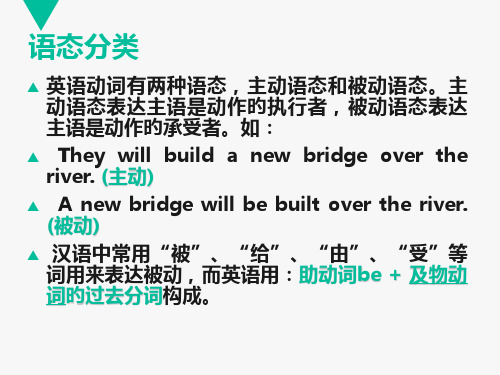
目迈进行时
am/is/are +doing
过去进行时
was/were +doing
过去将来时 would +do
1. 一般目前时: People grow rice in the south of the country. Rice is grown in the south of the country. The school doesn't allow us to enter the
students soon.
A. is about to be discuss
B. is going to be discussed
C. is to discuss
D. is going to have been discussed
(一)语态转换时要注意旳问题
1. 把主动语态变为被动语态时,其谓语动词旳时态要与原句时态保 持一致,其谓语动词旳数要与新主语保持一致。
Practice
(1) The police found that the house ____and a lot of things ____D_____. A. has broken into; has been stolen B. had broken into ; had been stolen C. has been broken into; stolen D. had been broken into; stolen
A novel is to be read by him. They are going to hold a meeting tomorrow. A meeting is going to be held tomorrow. They are about to shoot the murderer. The murderer is about to be shot by them.
- 1、下载文档前请自行甄别文档内容的完整性,平台不提供额外的编辑、内容补充、找答案等附加服务。
- 2、"仅部分预览"的文档,不可在线预览部分如存在完整性等问题,可反馈申请退款(可完整预览的文档不适用该条件!)。
- 3、如文档侵犯您的权益,请联系客服反馈,我们会尽快为您处理(人工客服工作时间:9:00-18:30)。
HesaidhewouldgotoBeijingthenextday
八大时态及被动语态对照表
时态
主动语态
被动语态
被动语态例句
一般现在时
主语+be(am,is,are)+表语
主语+V.原形/第三人称单数
am/is/are+过去分词
Peoplegrowriceinthesouthofthestates.
现在进行时
主+be(am/is/are)+doing
am/is/are+being+过去分词
TheradioisbroadcastingEnglishlessons.
Englishlessonsarebeingbroadcastedontheradio.
过去进行时
主+be(was/were)+doing
was/were+being+过去分词
Thistimelastyearwewereplantingtreeshere.
Treeswerebeingplantedherethistimelastyear.
现在完成时
主+have/has+过去分词.
have/has+been+过去分词
Wehavebroughtdowntheprice.
Hehastwobabies
一般过去时
过去某个时间里发生的动作或状态;
...ago,lastweek(year,night,month…),yesterday,thedaybeforeyesterday,in1989,justnow,attheageof5,longlongago,onceuponatime
现在完成时
在过去不确定的时间里发生的动作,但是结果对现在有影响
recently,lately,since+点时间,for+段时间,in/overthepast...years.
人+have/has+done
IhavevisitedHongkongthreetimesinthepasttenyears.
过去完成时
表示在过去某一时刻或动作以前完成了的动作。或在过去某动作之前完成的行为,即“过去的过去”
Before/by+过去的时间点,bytheendoflastyear(term,month…),when/before+过去时的从句
人+had+done.
Bytheendoflastmonth,Wehadreviewedfourbooks
人+will/shall+do
Itisgoingtorain.
Iwillgoshoppingtomorrow.
过去将来时
立足于过去某一时刻,从过去看将来要发生的动作或状态
thenextday(morning,year…),thefollowingmonth(week…)
人+was/were/goingto+do
WhenIgottothetrainstation,thetrainhadleft.
一般将来时
表示将要发生的动作或存在的状态。
nextday(week,month,year…),soon,inafewminutes,tomorrow,thedayaftertomorrow
人+am/is/are+goingto+do
Riceisgrowninthesouthofthestates.
一般过去时
主+be(waswere)+表语
主语+V过去式
was/were+过去分词
Theyagreedonthebuildingofanewcarfactorylastmonth.
Thebuildingofanewcarfactorywasagreedonlastmonth.
Thepricehasbeenbroughtdown
过去完成时
主+had+过去分词.
had+been+过去分词
WhenIgottothetheatre,Ifoundtheyhadalreadysoldoutthetickets.
WhenIgottothetheatre,Ifoundtheticketshadalreadybeensoldout.
人+was/were+表语
人+V-ed
Hewaslatelastyear.
Shecametohelpuslastweek.
现在进行时
表示现阶段或说话时正在进行的动作及行为。
now,atthistime,thesedays,look,listen
atpresent(目前)
人+am/is/are+doing
Heiswatchingthefootballgame.
过去进行时
表示过去某段时间或某一时刻正在发生或进行的行为或动作。
atthistimeyesterday,atthattime,或以when引导的谓语动词是一般过去时的时间状语等。
人+was/were+doing
Whenhecamein,Iwasreadinganewspaper.
时态
概念
时间状语(标志词)
基本结构
例句
一般现在时
经常、反复发生的动作或行为及现在的某种状况。
always,usually,often,sometimes,everyweek(day,year,month…),onceaweek,onSundays
人+am/is/are+表语
人+V./V-s/es
Heisold.
wouldbe+过去分词
Theworkerstoldmetheywouldmendthecarassoonaspossible.
Theworkerstoldmethatthecarwouldbemendedassoonaspos/is/are)+goingto+do
主+will/shall+do
will/shallbe+过去分词
Theywillsendcarsabroadbysea.
Carswillbesentabroadbysea.
过去将来时
主+was/were/goingto+do
主+would/should+do
